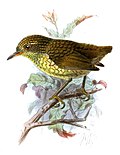| Aphanotriccus | |
|---|---|
 | |
| Tawny-chested flycatcher (Aphanotriccus capitalis) | |
| Scientific classification | |
| Kingdom: | Animalia |
| Phylum: | Chordata |
| Class: | Aves |
| Order: | Passeriformes |
| Family: | Tyrannidae |
| Genus: | Aphanotriccus Ridgway, 1905 |
| Type species | |
| Myiobius capitalis [1] Salvin, 1865 | |
| Species | |
A. capitalis | |
Aphanotriccus is a small genus of passerine birds in the tyrant flycatcher family. They breed in the Caribbean lowlands and foothills of Central America.


